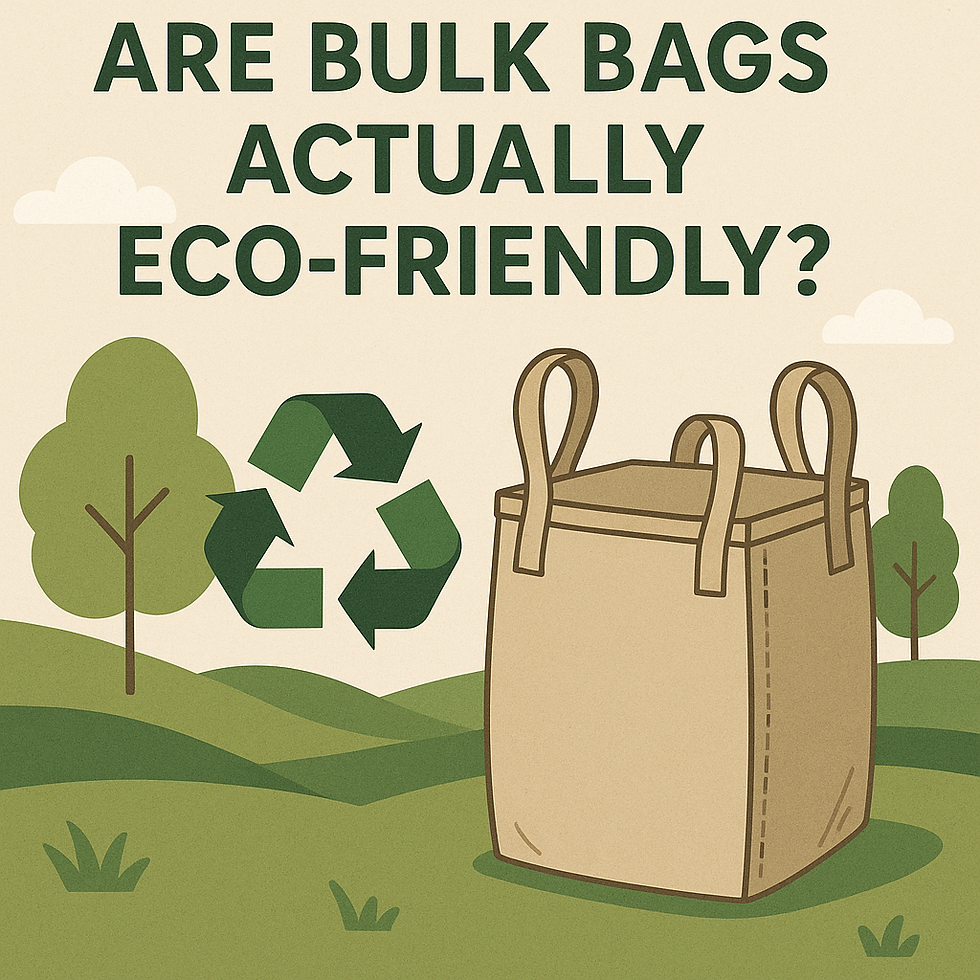What are bulk bags made of - and is it Sustainable?
- judi306
- Oct 7, 2025
- 2 min read

When you hear that bulk bags—also known as FIBCs (Flexible Intermediate Bulk Containers)—are made of plastic, you might assume they’re not eco-friendly. After all, plastic doesn’t exactly have the best environmental reputation these days.
But here’s the thing: not all plastics are created equal, and when it comes to bulk bags, the material they’re made from—woven polypropylene (PP)—tells a much more interesting story.
Let’s break it down.
🧵 What Is Woven Polypropylene?
Polypropylene is a type of thermoplastic polymer derived from petroleum. It’s lightweight, extremely durable, resistant to moisture and chemicals, and most importantly—recyclable.
In the case of bulk bags, this plastic is spun into threads, woven into fabric, and then stitched into high-strength bags capable of holding up to 4,000 lbs or more. The result? A tough, flexible container that can be reused many times and withstand some of the harshest industrial environments.
✅ Why Use Polypropylene?
There are a few key reasons why polypropylene is the material of choice for FIBCs:
Durability: It holds up under stress, pressure, heat, and weight.
Lightweight: Keeps transportation and handling efficient.
Water-resistant: Keeps contents safe from moisture.
Food-safe options: With proper certification, it’s safe for food and pharma use.
Recyclability: It can be reprocessed into new plastic products.
This makes woven PP one of the most practical and long-lasting packaging materials available for bulk handling—without sacrificing sustainability.
♻️ Is Polypropylene Sustainable?
It depends on how it's used—and reused.
On its own, polypropylene isn’t biodegradable. But when you consider its long lifespan and ability to be recycled, it starts to look a lot more eco-friendly than other short-lived packaging materials.
Think of it this way:
One multi-use bulk bag can replace dozens of single-use bags or boxes.
At the end of its life, it can be recycled into everything from new bags to plastic lumber or automotive parts.
With proper handling, it supports closed-loop packaging systems—a major step toward circular supply chains.
In other words, it’s not about whether the material is perfect. It’s about whether we’re using it wisely.
🆚 How It Compares to Other Packaging Materials
Material | Reusable | Recyclable | Biodegradable | Ideal For |
Woven Polypropylene | ✅ Yes | ✅ Yes | ❌ No | Heavy-duty industrial packaging |
Paper Bags | ❌ Limited | ✅ Sometimes | ✅ Yes | Light dry goods |
Plastic Film | ❌ No | ❌ Rarely | ❌ No | Single-use packaging |
Cotton/Jute Sacks | ✅ Yes | ❌ Rarely | ✅ Yes | Niche agricultural use |
Woven PP strikes a solid balance between performance and sustainability, especially when used in multi-trip applications and recycled responsibly.
🌍 The Bottom Line
Bulk bags are made from a petroleum-based plastic—yes. But that doesn’t mean they’re a sustainability problem.
In fact, woven polypropylene, when used in durable, reusable packaging like FIBCs, can be part of the solution to packaging waste and overconsumption. The key is to:
Reuse bags safely and often
Recycle them properly
Choose quality bags that last longer
When treated as part of a long-term packaging strategy, bulk bags can reduce environmental impact, lower operational costs, and support greener supply chains.




Comments